Update: VT Court Considers Whether to Dismiss Middlebury College De-Naming Lawsuit
Last Friday the court heard oral argument over whether the Mead descendants can sue the school for removing their ancestor’s family name from its iconic chapel 100 years after its dedication.
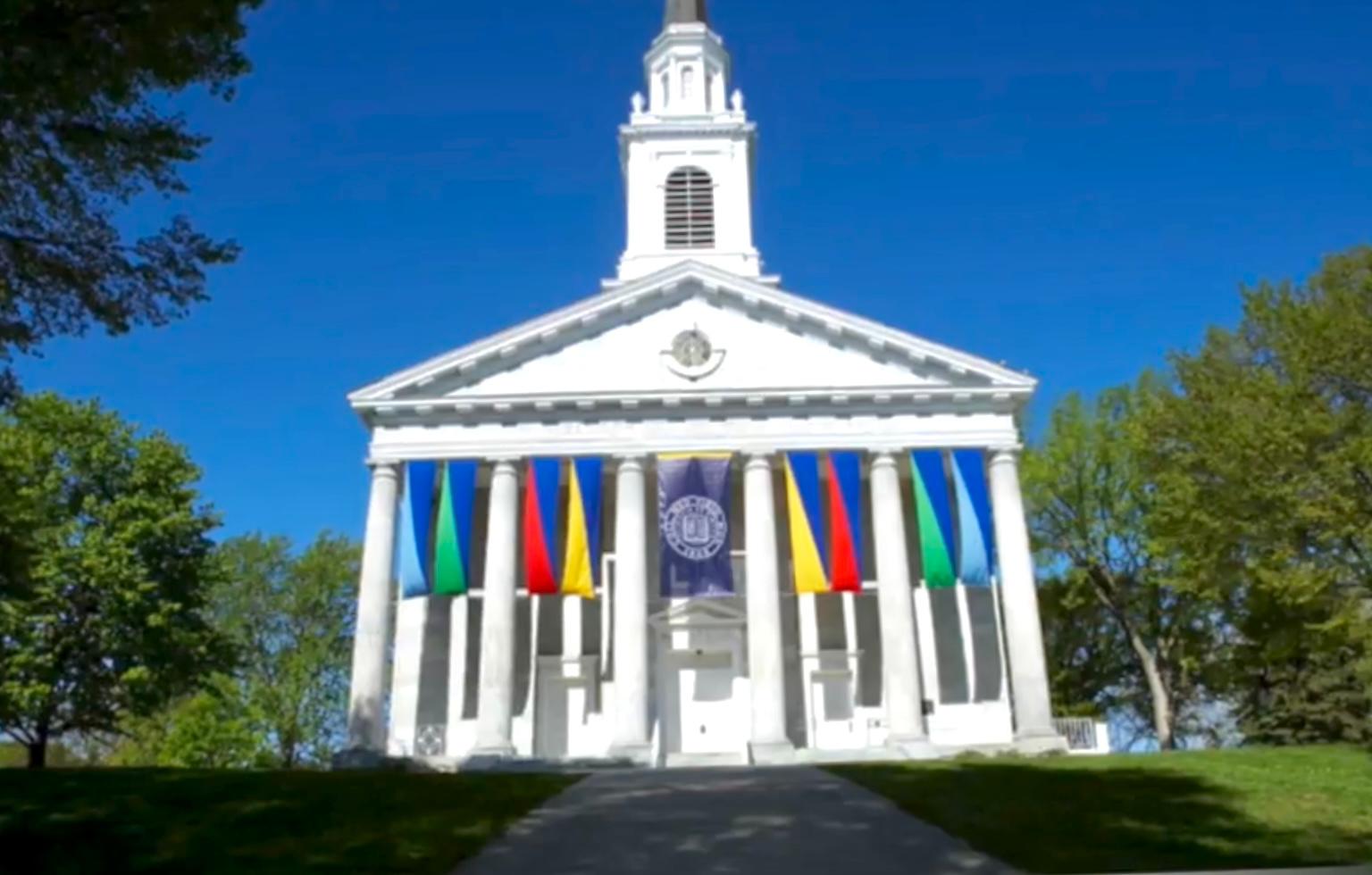
Last Friday, the parties in the Middlebury College de-naming lawsuit gathered before Vermont Superior Court Judge Robert A. Mello to present their arguments on whether the court should grant the school’s motion to dismiss it.
The case comes out of Middlebury’s decision in September of 2021 to strip the iconic Mead Memorial Chapel of the name of its benefactor, former Vermont Governor John Abner Mead. The school said they did it because they found out he played an “instigating role” in the eugenics movement. Mead’s estate sued Middlebury over the de-naming this past March.
Background on the lawsuit, which is led by another former Vermont governor and Middlebury alumnus, James Douglas, is here:
- Middlebury College Sued for Removing Name of Former VT Governor From Chapel
- Exclusive Video Interview: Former VT Governor On His Challenge To Middlebury College’s De-Naming Iconic Mead Chapel
- Middlebury College Eugenics Hypocrisy Revealed In Mead Chapel De-Naming Dispute
At the hearing last week, the parties argued for over an hour, mostly about how the court should view Mead’s arrangement with Middlebury and what law should govern it.
Toward the end, though, the judge asked not about the law, but about the facts. He wanted to know what was happening in these Mead family photos[*]:
That is Mead’s grandson, Little John, placing his bible into the cornerstone of the future Mead Memorial Chapel at the 1914 groundbreaking ceremony. Tucked inside the volume was the Mead family tree, the estate’s lawyer explained to the judge on Friday.
The chapel eventually constructed around it would be made of stunning white Vermont marble. And, as Douglas pointed out when we spoke, that marble is forever.
But the dispute over whether to dismiss the case before it goes to trial isn’t about what’s buried deep inside the marble building. It’s about the name that used to be on the outside. It’s about what the parties had in mind when they put it there and whether 100 years later Mead’s descendants can sue Middlebury for taking it off.
In its motion to dismiss, Middlebury argues they cannot. Mead’s endowment of the chapel should be viewed as a charitable gift, they say, and Mead did not explicitly condition that gift on a grant of naming rights. And even if he had, the Mead descendants would not have standing to challenge the de-naming; only the state Attorney General has that authority in Vermont.
The Mead family, however, says the court should view the transaction between Mead and the school as a contract. (They re-state that alternatively, the de-naming was a breach of a conditional gift, as alleged in their complaint.) They argue that Middlebury entered into an agreement and made a “sacred promise” to Governor Mead to erect and complete the “Mead Memorial Chapel.” Viewed this way, the school breached that agreement when they removed the family name, and the descendants are entitled to proceed with their lawsuit.
Although the school earlier told one of the Mead descendants that there was “simply no evidence” of such an agreement, the family uncovered numerous contemporaneous writings showing that there was. They are attached as exhibits to the original complaint and collected at the meadmemorialchapel.com website.
The estate points to the essential elements of a contract—offer, acceptance, consideration, and a meeting of the minds—contained in these writings.
There is Mead’s offer letter showing he intended the chapel to be named after his family. At Friday’s oral argument, the estate’s lawyer argued the Mead name was “the essential consideration” for the agreement:
And there are two letters from Middlebury trustees gratefully accepting Mead’s offer:
And here is where the parties’ minds meet. You can tell the trustees knew what they were agreeing to, because they recorded their resolutions agreeing to it—and included, transcribed verbatim, Mead’s entire offer letter:
How the court will ultimately view this evidence remains to be seen.
At Friday’s hearing, Middlebury’s lawyer argued against construing the arrangement between the parties as a contract; that would amount to a “substantial change” in the existing law, he said. And although the Mead family name had been on the chapel for over a century, keeping it there, he said, was not a legally enforceable condition.
But the estate’s lawyer said the Mead de-naming dispute isn’t the typical case addressed by that law. Unlike other benefactors, Mead didn’t merely pledge money to the school and then walk away, a point I discussed with Douglas this past May. As the lawyer put it on Friday, “he was giving a chapel with a name and they accepted the chapel with the name.” The Mead name, as mentioned above, was an essential term of the contract.
In fact, it was an honor—and a benefit to the school—to have the Mead name on the prominent building dedicated to perpetuating the religious life of the campus community. The Mead family’s considerable prestige would encourage others to emulate his generosity. “They got to use his name because his name meant something,” their lawyer said.
Even so, Middlebury maintains that the estate still has to prove the parties expressly agreed to keep the Mead name on the building in perpetuity—i.e., forever.
But as the estate’s lawyer asked rhetorically on Friday, why in the world would they do that? Mead and the Middlebury trustees were “lifelong friends.” They had known and trusted one another for years. There was simply no reason to think they would go back on their word.
And here, it is hard not to think, there was something else the parties didn’t contemplate when they pledged to make the chapel “an instrument of great good to those of this generation and those of the distant future.” Did they foresee that those of the distant future would be so smug in their self-righteousness as to turn against their benefactors?
Middlebury didn’t take the Mead family name off the chapel because they needed its space for some new pressing purpose—say, a classroom building or dormitories. By their own admission, they de-named the chapel to express their contempt for its builder, even as they continue to benefit from his gift.
In the weeks to come, as the court considers Middlebury’s motion to dismiss, it can look to the past with a more generous eye. Under contract law, if it concludes that the parties made a contract, but that the parties’ intent as to the naming of the chapel is ambiguous, the court may look beyond the four corners of the documents to deduce that intent.
And if the judge’s fact question last Friday is any sign, he may look to the chapel itself for the answer. When he does, he will find the Mead family name Little John placed in the cornerstone deep within the white Vermont marble, a symbolic reminder of the parties’ intent.
——————
[*] Images in this post are from the meadmemorialchapel.com website.
 DONATE
DONATE
Donations tax deductible
to the full extent allowed by law.

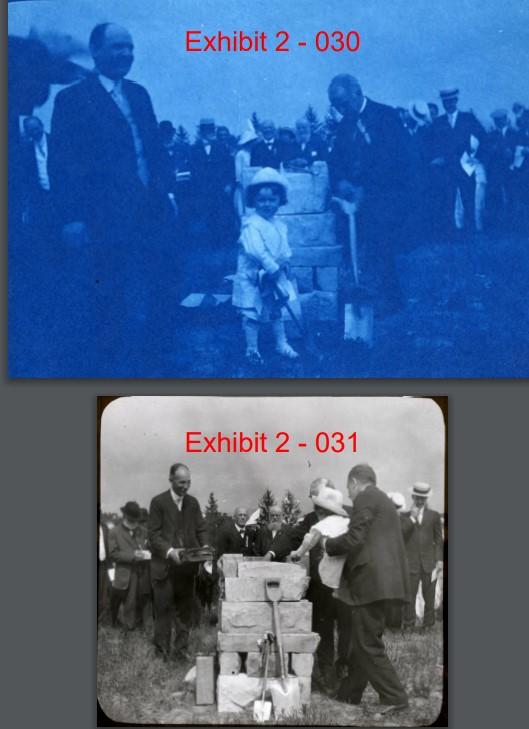
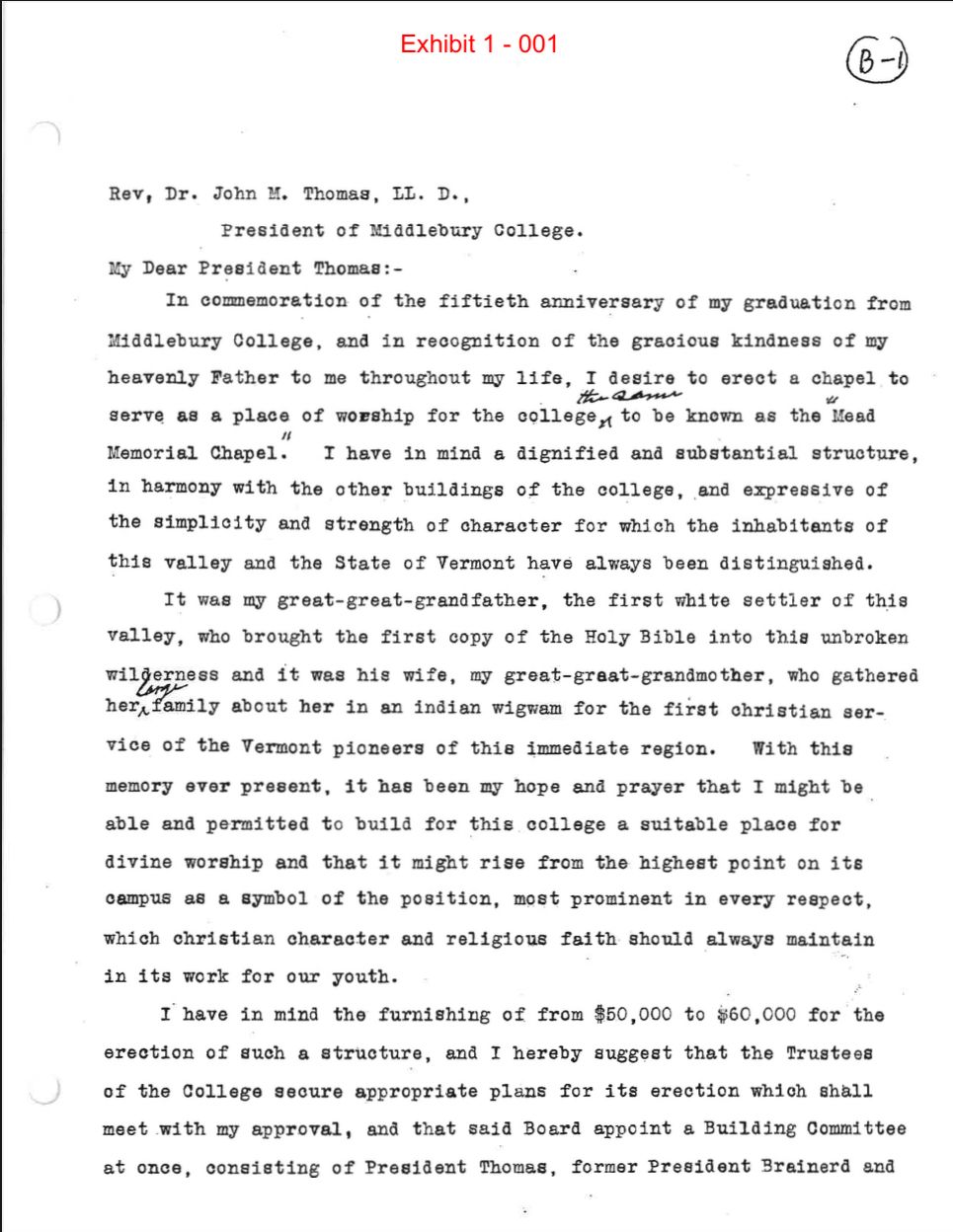
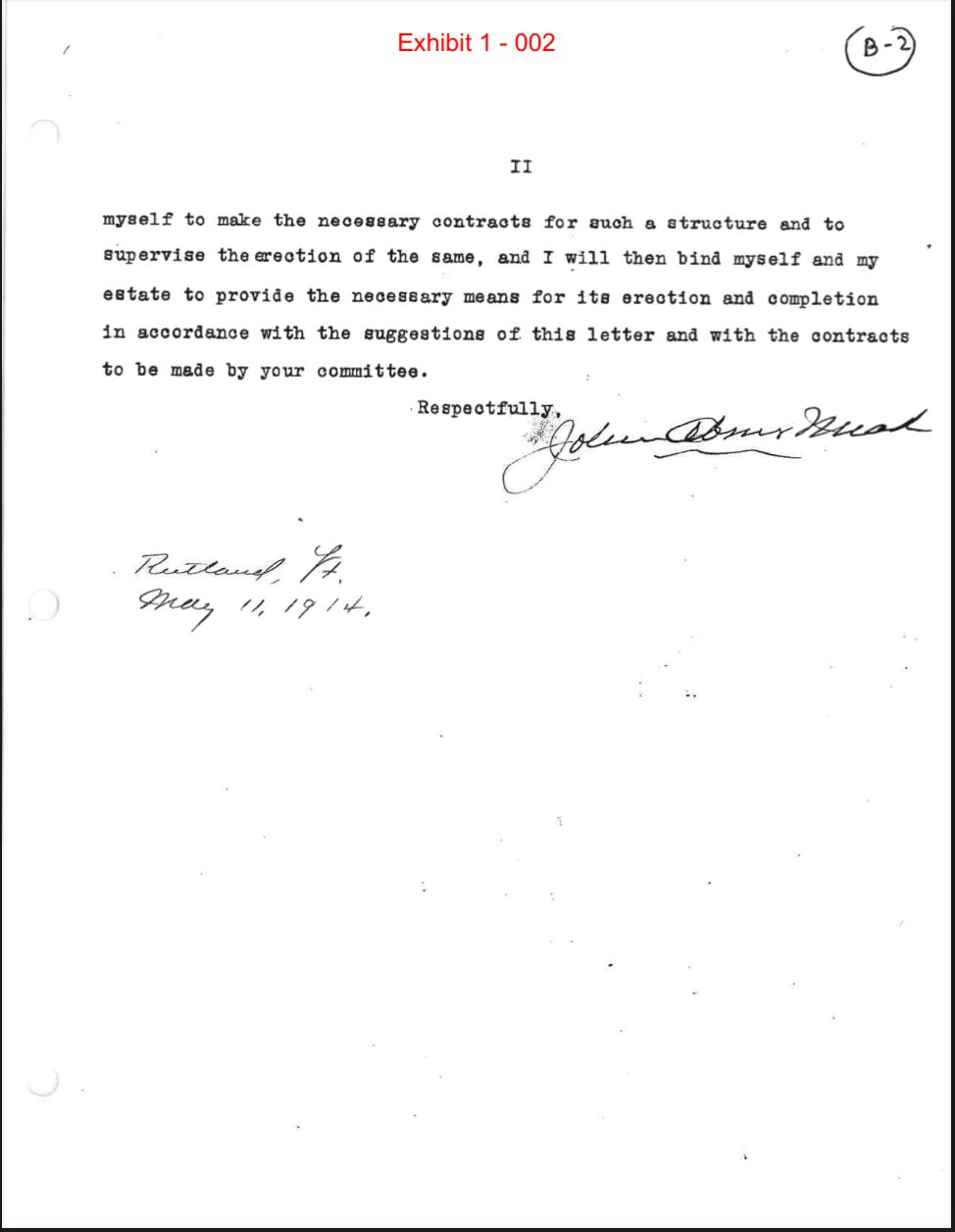

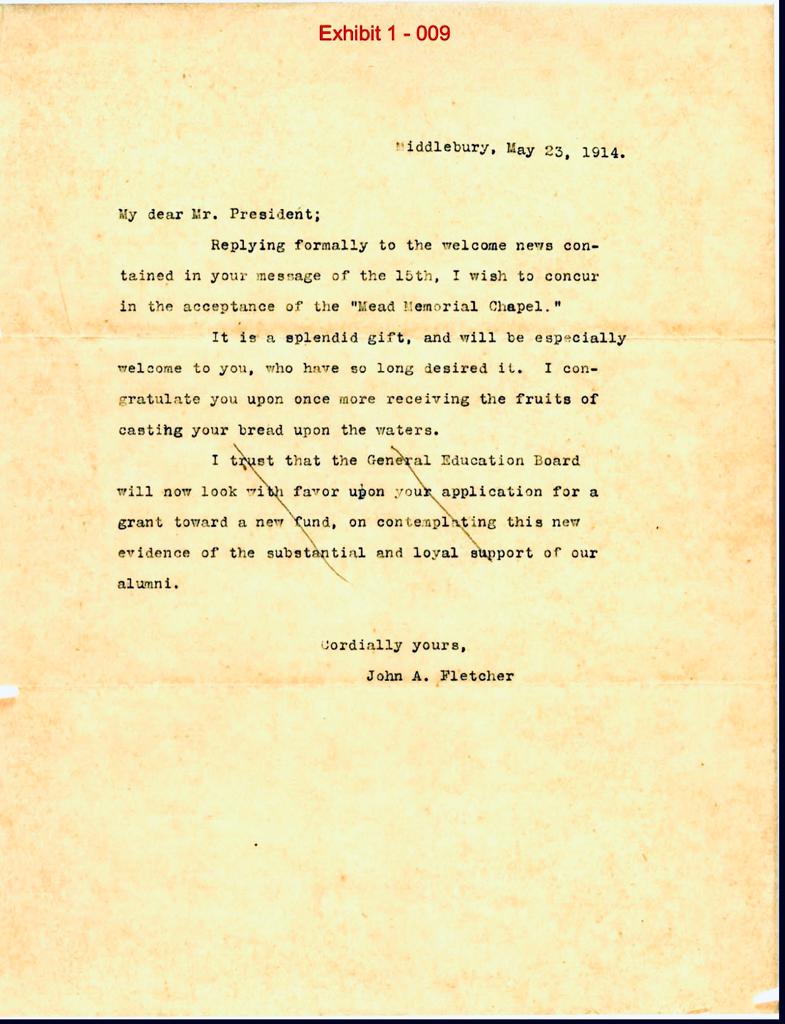
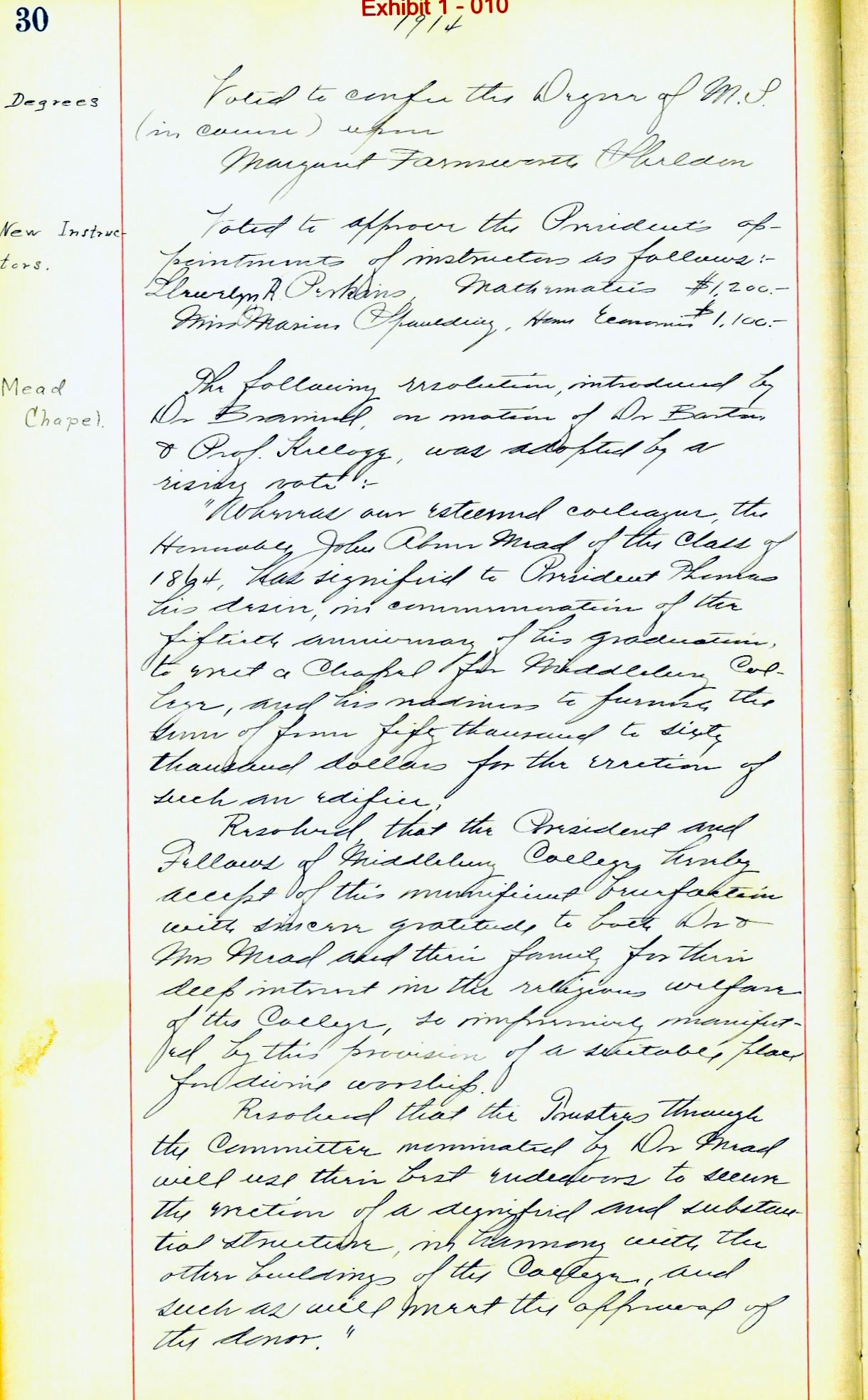
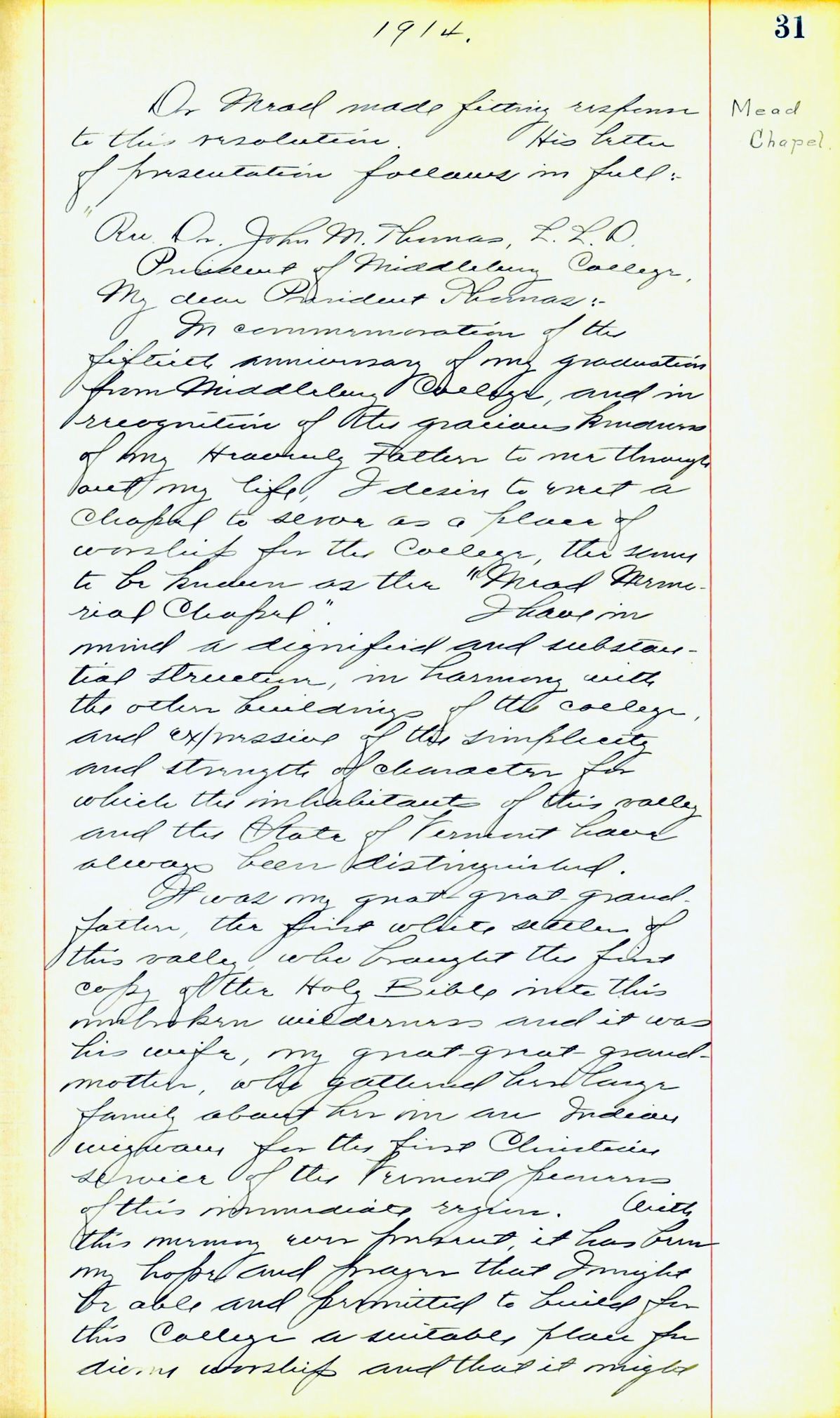









Comments
Perhaps Governor Mead is crying out from the grave to allow his name to be taken off the chapel. A man of such strong traditional Christian belief can hardly want his intended place of worship to be defiled with the festooning of pride flags and the dissemination of heretical garbage.
“The school said they did it because they found out he played an “instigating role” in the eugenics movement.”
What duplicity. These are the very same people who shriek abortion is a constitutional right. The church of Planned Parenthood was founded by a eugenicist.
Looks like cancel culture is alive and well in enlightened Vermont.
Rank hypocrisy for Progressives to act all blameless and above-it-all when Eugenics was a huge smash hit project of theirs — core Marxist in its positing of a new, improved and reformed human nature and intent on carrying it out through a breeding program. Thoroughly, exclusively Progressive project all the way from the get-go. Very big names involved. Now they’re disowning it? Give me a break. Smdh the audacity of these people.
Plus, what do they care about religion? Looks like they’re just using it as a blunt instrument here
The Right Giveth and the Left Taketh Away. It’s Vermont, the successful beachhead of the Left. While Christian have the Great Commission, the Left has their version… “go out and corrupt the world”.
“Although the school earlier told one of the Mead descendants that there was “simply no evidence” of such an agreement, the family uncovered numerous contemporaneous writings showing that there was.”
What? How dare you present facts which contradict our baseless assertions! Your hate triggers us! You are committing violent speech against us!
No one has the right to destroy another person’s belief by demanding empirical evidence.
–ANN LANDERS
All of this name-changing wokeness demands that Yale University must change its name, since it is named after a slave-trader. I suggest they should name it after their hero, Karl Marx.
The present value of $60,000 in 1914 dollars is $1,849,145 in 2023 dollars. That is based, of course, on our government’s estimate of the inflation rate. Is the school ready to pay that?